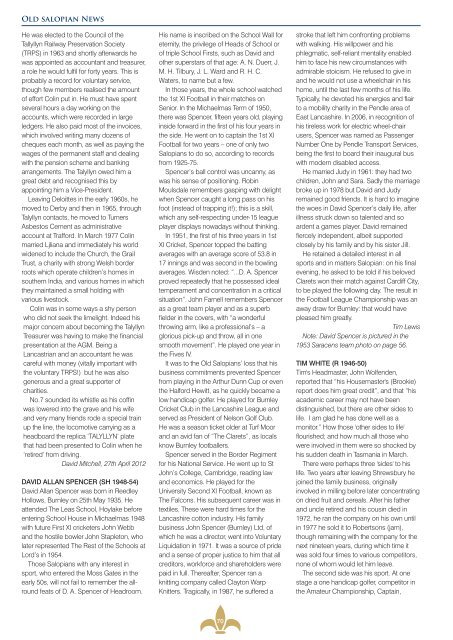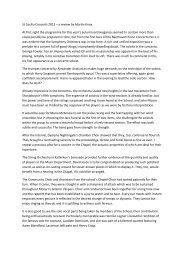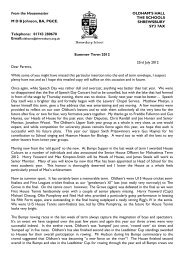SUMMER 2012 ISSUE No. 150 - Shrewsbury School
SUMMER 2012 ISSUE No. 150 - Shrewsbury School
SUMMER 2012 ISSUE No. 150 - Shrewsbury School
You also want an ePaper? Increase the reach of your titles
YUMPU automatically turns print PDFs into web optimized ePapers that Google loves.
Old salopian News<br />
He was elected to the Council of the<br />
Tallyllyn Railway Preservation Society<br />
(TRPS) in 1963 and shortly afterwards he<br />
was appointed as accountant and treasurer,<br />
a role he would fulfil for forty years. This is<br />
probably a record for voluntary service,<br />
though few members realised the amount<br />
of effort Colin put in. He must have spent<br />
several hours a day working on the<br />
accounts, which were recorded in large<br />
ledgers. He also paid most of the invoices,<br />
which involved writing many dozens of<br />
cheques each month, as well as paying the<br />
wages of the permanent staff and dealing<br />
with the pension scheme and banking<br />
arrangements. The Talyllyn owed him a<br />
great debt and recognised this by<br />
appointing him a Vice-President.<br />
Leaving Deloittes in the early 1960s, he<br />
moved to Derby and then in 1965, through<br />
Talyllyn contacts, he moved to Turners<br />
Asbestos Cement as administrative<br />
account at Trafford. In March 1977 Colin<br />
married Ljliana and immediately his world<br />
widened to include the Church, the Grail<br />
Trust, a charity with strong Welsh border<br />
roots which operate children’s homes in<br />
southern India, and various homes in which<br />
they maintained a small holding with<br />
various livestock.<br />
Colin was in some ways a shy person<br />
who did not seek the limelight. Indeed his<br />
major concern about becoming the Talyllyn<br />
Treasurer was having to make the financial<br />
presentation at the AGM. Being a<br />
Lancastrian and an accountant he was<br />
careful with money (vitally important with<br />
the voluntary TRPS!) but he was also<br />
generous and a great supporter of<br />
charities.<br />
<strong>No</strong>.7 sounded its whistle as his coffin<br />
was lowered into the grave and his wife<br />
and very many friends rode a special train<br />
up the line, the locomotive carrying as a<br />
headboard the replica ‘TALYLLYN’ plate<br />
that had been presented to Colin when he<br />
‘retired’ from driving.<br />
David Mitchell, 27th April <strong>2012</strong><br />
DAVID ALLAN SPENCER (SH 1948-54)<br />
David Allan Spencer was born in Reedley<br />
Hollows, Burnley on 25th May 1935. He<br />
attended The Leas <strong>School</strong>, Hoylake before<br />
entering <strong>School</strong> House in Michaelmas 1948<br />
with future First XI cricketers John Webb<br />
and the hostile bowler John Stapleton, who<br />
later represented The Rest of the <strong>School</strong>s at<br />
Lord’s in 1954.<br />
Those Salopians with any interest in<br />
sport, who entered the Moss Gates in the<br />
early 50s, will not fail to remember the allround<br />
feats of D. A. Spencer of Headroom.<br />
His name is inscribed on the <strong>School</strong> Wall for<br />
eternity, the privilege of Heads of <strong>School</strong> or<br />
of triple <strong>School</strong> Firsts, such as David and<br />
other superstars of that age: A. N. Duerr, J.<br />
M. H. Tilbury, J. L. Ward and R. H. C.<br />
Waters, to name but a few.<br />
In those years, the whole school watched<br />
the 1st XI Football in their matches on<br />
Senior. In the Michaelmas Term of 1950,<br />
there was Spencer, fifteen years old, playing<br />
inside forward in the first of his four years in<br />
the side. He went on to captain the 1st XI<br />
Football for two years – one of only two<br />
Salopians to do so, according to records<br />
from 1925-75.<br />
Spencer’s ball control was uncanny, as<br />
was his sense of positioning. Robin<br />
Moulsdale remembers gasping with delight<br />
when Spencer caught a long pass on his<br />
foot (instead of trapping it!); this is a skill,<br />
which any self-respecting under-15 league<br />
player displays nowadays without thinking.<br />
In 1951, the first of his three years in 1st<br />
XI Cricket, Spencer topped the batting<br />
averages with an average score of 53.8 in<br />
17 innings and was second in the bowling<br />
averages. Wisden noted: “...D. A. Spencer<br />
proved repeatedly that he possessed ideal<br />
temperament and concentration in a critical<br />
situation”. John Farnell remembers Spencer<br />
as a great team player and as a superb<br />
fielder in the covers, with “a wonderful<br />
throwing arm, like a professional’s – a<br />
glorious pick-up and throw, all in one<br />
smooth movement”. He played one year in<br />
the Fives IV.<br />
It was to the Old Salopians’ loss that his<br />
business commitments prevented Spencer<br />
from playing in the Arthur Dunn Cup or even<br />
the Halford Hewitt, as he quickly became a<br />
low handicap golfer. He played for Burnley<br />
Cricket Club in the Lancashire League and<br />
served as President of Nelson Golf Club.<br />
He was a season ticket older at Turf Moor<br />
and an avid fan of “The Clarets”, as locals<br />
know Burnley footballers.<br />
Spencer served in the Border Regiment<br />
for his National Service. He went up to St<br />
John’s College, Cambridge, reading law<br />
and economics. He played for the<br />
University Second XI Football, known as<br />
The Falcons. His subsequent career was in<br />
textiles. These were hard times for the<br />
Lancashire cotton industry. His family<br />
business John Spencer (Burnley) Ltd, of<br />
which he was a director, went into Voluntary<br />
Liquidation in 1971. It was a source of pride<br />
and a sense of proper justice to him that all<br />
creditors, workforce and shareholders were<br />
paid in full. Thereafter, Spencer ran a<br />
knitting company called Clayton Warp<br />
Knitters. Tragically, in 1987, he suffered a<br />
70<br />
stroke that left him confronting problems<br />
with walking. His willpower and his<br />
phlegmatic, self-reliant mentality enabled<br />
him to face his new circumstances with<br />
admirable stoicism. He refused to give in<br />
and he would not use a wheelchair in his<br />
home, until the last few months of his life.<br />
Typically, he devoted his energies and flair<br />
to a mobility charity in the Pendle area of<br />
East Lancashire. In 2006, in recognition of<br />
his tireless work for electric wheel-chair<br />
users, Spencer was named as Passenger<br />
Number One by Pendle Transport Services,<br />
being the first to board their inaugural bus<br />
with modern disabled access.<br />
He married Judy in 1961: they had two<br />
children, John and Sara. Sadly the marriage<br />
broke up in 1978 but David and Judy<br />
remained good friends. It is hard to imagine<br />
the woes in David Spencer’s daily life, after<br />
illness struck down so talented and so<br />
ardent a games player. David remained<br />
fiercely independent, albeit supported<br />
closely by his family and by his sister Jill.<br />
He retained a detailed interest in all<br />
sports and in matters Salopian: on his final<br />
evening, he asked to be told if his beloved<br />
Clarets won their match against Cardiff City,<br />
to be played the following day. The result in<br />
the Football League Championship was an<br />
away draw for Burnley: that would have<br />
pleased him greatly.<br />
Tim Lewis<br />
<strong>No</strong>te: David Spencer is pictured in the<br />
1953 Saracens team photo on page 56.<br />
TIM WHITE (R 1946-50)<br />
Tim's Headmaster, John Wolfenden,<br />
reported that “his Housemaster's (Brookie)<br />
report does him great credit”, and that “his<br />
academic career may not have been<br />
distinguished, but there are other sides to<br />
life. I am glad he has done well as a<br />
monitor.” How those 'other sides to life'<br />
flourished; and how much all those who<br />
were involved in them were so shocked by<br />
his sudden death in Tasmania in March.<br />
There were perhaps three 'sides' to his<br />
life. Two years after leaving <strong>Shrewsbury</strong> he<br />
joined the family business, originally<br />
involved in milling before later concentrating<br />
on dried fruit and cereals. After his father<br />
and uncle retired and his cousin died in<br />
1972, he ran the company on his own until<br />
in 1977 he sold it to Robertsons (jam),<br />
though remaining with the company for the<br />
next nineteen years, during which time it<br />
was sold four times to various competitors,<br />
none of whom would let him leave.<br />
The second side was his sport. At one<br />
stage a one handicap golfer, competitor in<br />
the Amateur Championship, Captain,





